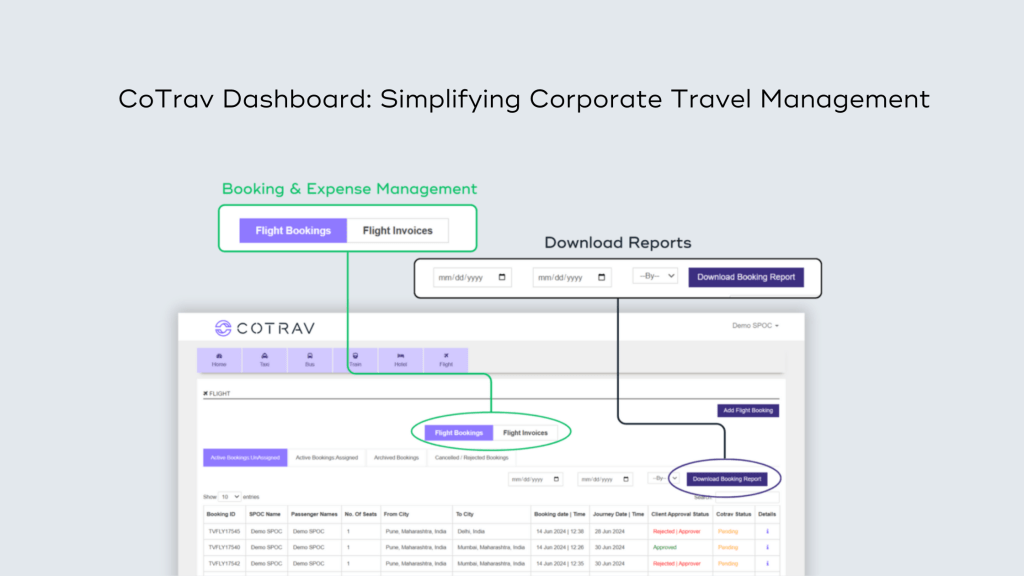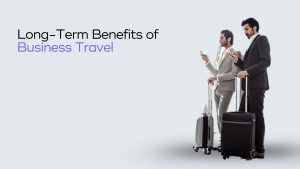What comes to mind when you hear “business travel”?
For HR professionals, it’s not just about flights and meetings—it’s about crafting seamless, cost-effective travel experiences that keep employees happy and operations smooth.
If you handle travel policies, approvals, or budgets, this guide is your go-to resource.
We’ll tackle planning, managing employee concerns, and solving common travel challenges—all from an HR perspective.
Discover why business travel drives corporate success, how to streamline the process, and furthermore, the latest trends to stay ahead.
Let’s make business travel smarter, simpler, and perfectly aligned with your HR goals!

What is Business Travel?
Business travel is the lifeblood of corporate growth, enabling companies to connect, collaborate, and compete in a global marketplace.
At its core, it involves employees traveling for work-related purposes.
Whether it’s to close deals, attend conferences, or visit branch offices, these trips are essential for maintaining client relationships, expanding networks, and achieving organizational goals.
For Example:
- A sales executive traveling to New York to finalize a contract with a key client.
- A team attending a technology expo in Berlin to showcase their latest product.
- A manager visiting a factory in Mumbai to oversee operations and ensure quality standards.
- An HR professional traveling to Singapore to conduct training sessions for a regional team.
These scenarios highlight how business travel fuels growth and keeps businesses running smoothly.
Types of Business Travel
Business travel comes in many forms, depending on the goals and needs of your company.
Here’s a quick look at the most common types you might encounter:
1. Client Meetings
You’ve probably traveled to meet a client face-to-face, right?
Whether it’s presenting a proposal, closing a deal, or simply strengthening a relationship, these trips are all about building trust and sealing opportunities.
2. Conferences and Events
If you’ve attended an industry conference, you know how valuable they are for networking and staying updated on trends. These trips let you connect with peers, showcase your company, and learn from experts.
3. Training and Development
Ever been sent to a workshop or certification program?
Companies often invest in sending employees to these programs to enhance skills, share knowledge, and improve overall performance.
4. Site Visits
If your company operates in multiple locations, you might travel to check on projects, visit branch offices, or oversee manufacturing units. It’s a hands-on way to ensure everything is running smoothly.
5. Relocation Trips
Sometimes, you may need to relocate temporarily or permanently for work. In such cases, this type of business travel involves moving to a different city or country to manage a project, take up a new role, or support a company expansion.
Each of these travel types plays a role in achieving business goals.
Whether you’re attending a high-stakes meeting or learning at a conference, business travel is all about making meaningful connections and driving success.
Importance of Business Travel for Organizational Growth

How does HR transform business travel into a catalyst for growth while keeping everything on track?
Business travel is far more than booking flights and hotels. It’s about enabling employees to create meaningful connections, close crucial deals, and explore opportunities that virtual meetings simply can’t replicate.
For HR, the challenge lies in balancing efficiency, cost control, and employee satisfaction while ensuring every trip delivers real value.Face-to-face interactions are the foundation of trust and long-lasting partnerships.
Whether it’s pitching to a potential client, managing a high-stakes negotiation, or attending industry events, these experiences fuel collaboration and innovation.
Business travel also plays a critical role in professional growth, allowing employees to gain new insights, build networks, and sharpen their skills.
HR’s role is pivotal in this ecosystem—designing clear travel policies, ensuring compliance, and addressing employees’ needs to make travel stress-free and productive.
By adopting smart tools, streamlining approvals, and negotiating better vendor deals, HR can ensure trips are not just cost-effective but impactful.
Role of HR in Managing Business Travel
HR professionals are at the core of managing business travel effectively. Not only do they approve travel requests, but their role also involves crafting policies that balance cost efficiency with employee comfort.
HR is responsible for:
- Policy Development: Creating clear, transparent travel policies that align with company goals while meeting employee needs.
- Travel Approvals: Managing requests efficiently to ensure timely bookings and compliance with budgets.
- Employee Support: Addressing concerns related to itineraries, reimbursements, or emergency assistance during travel.
- Vendor Management: Partnering with travel providers to negotiate better rates for flights, hotels, and transportation.
By streamlining these processes, HR effectively ensures that business travel contributes to organizational growth, all while preventing unnecessary stress for employees.
Challenges HR Faces in Managing Business Travel:
Managing business travel comes with its own set of challenges, including:
- Balancing Efficiency and Cost Control: Ensuring trips are productive while staying within budget constraints.
- Ensuring Policy Compliance: Making sure employees follow travel policies without compromising their needs.
- Last-Minute Changes: Dealing with unexpected changes in schedules, bookings, or travel requirements.
- Managing Employee Satisfaction: Keeping employees comfortable and stress-free while traveling, even with tight budgets or tight schedules.
- Handling Complex Approvals: Streamlining travel approvals across multiple levels of the organization for timely decision-making.
- Maintaining Safety and Security: Ensuring employee safety during travel, especially in unpredictable or high-risk situations.
- Vendor Negotiations: Getting the best rates for travel services like flights, hotels, and transport without sacrificing quality.
- Tracking and Reporting: Managing travel expenses, maintaining records, and ensuring compliance for audits and reporting.
HR’s ability to address these challenges directly impacts employee satisfaction and organizational efficiency.
By leveraging tools like travel management software, strong vendor relationships, and clear communication, HR can transform business travel into a streamlined, strategic advantage for the company.
Common Goals of Business Travel for HR
Business travel isn’t just about flights and hotel bookings; rather, it’s about advancing the company’s goals and supporting employee growth.
As HR, understanding the purpose behind each trip helps ensure they add value to the organization and its employees.
Here are some common goals of business travel from an HR perspective:
1. Strengthening Client Relationship
Face-to-face meetings build trust and foster deeper connections with clients, allowing employees to better understand client needs.
2. Closing Deals and Negotiations
Some agreements need in-person discussions. HR supports employees during these critical moments to secure successful outcomes.
3. Attending Conferences and Networking
Industry events offer insights, collaboration opportunities, and a chance to represent the company. Moreover, HR ensures employees leverage these events effectively.
4. Overseeing Projects
On-site visits allow employees to monitor progress, address issues, and align projects with company goals, with HR ensuring smooth arrangements.
5. Training and Skill Development
Travel for workshops and training brings new skills and knowledge, enhancing both individual and organizational growth.
6. Exploring New Opportunities
Business trips expose employees to new markets and innovative ideas, helping the company stay competitive.
By aligning travel with strategic priorities and supporting employees throughout, HR ensures every trip delivers value, driving both business success and professional development.
Corporate Travel Policies: Why HR Should Prioritize Them

As an HR professional, ensuring that your company’s travel policies are clear, comprehensive, and effective is a key responsibility.
A well-structured corporate travel policy doesn’t just serve as a set of rules—it’s a tool to make travel safer, more efficient, and cost-effective for both employees and the company.
Here’s why a travel policy matters and the essential components it should include.
Why Every Company Needs a Travel Policy
A solid travel policy benefits everyone involved, from employees to finance teams.
Here’s why your organization needs one:
- Clarity and Consistency: A clear travel policy removes any confusion about what’s allowed and what’s not. Moreover, it provides employees with specific guidelines for booking flights, choosing hotels, and adhering to spending limits.
This consistency prevents confusion and streamlines the entire travel process.
- Cost Management: A travel policy helps control travel expenses, ensuring that the company stays within budget.
By setting spending limits for different aspects of the trip—flights, accommodation, meals, and transportation—you help prevent overspending while still allowing employees to travel comfortably.
- Safety and Support: A good travel policy prioritizes employee safety. It outlines what to do in case of emergencies and provides support resources.
Knowing exactly what steps to take in the event of travel disruptions or other issues ensures that employees feel supported and prepared.
For example: If traveling to a region prone to extreme weather conditions, the policy may include safety protocols and emergency contacts, offering peace of mind to both employees and HR.
Key Components of a Travel Policy
A comprehensive corporate travel policy should cover several crucial elements to ensure smooth and efficient travel.
These include:
1. Expense Limits:
Set clear caps on how much can be spent on flights, accommodation, meals, and transportation. These limits help employees stay within budget and prevent unnecessary overspending.
For example: Employees may have a set per-night hotel allowance, allowing them to choose comfortable yet reasonably priced accommodations.
2. Reimbursement Processes:
Employees must know how to submit expenses for reimbursement. In addition, a well-defined process ensures they’re quickly repaid for out-of-pocket costs. This includes instructions on what receipts to keep and how to submit them.
For example: Employees may be required to upload receipts to an expense management system or email them to the finance department within a specified timeframe.
3. Compliance Guidelines:
Specify preferred vendors, booking platforms, or airlines. This ensures employees are booking through channels that align with company policies, enabling easier tracking of expenses and better vendor deals.
For example: If your company has a preferred airline or booking platform that offers discounted rates, employees should comply to take advantage of these savings.
Balancing Flexibility with Guidelines
While corporate travel policies are designed to maintain order and control costs, they shouldn’t be overly restrictive.
HR should focus on striking a balance between company guidelines and employee flexibility. As a result, this ensures smoother, more personalized travel experiences.
- Allowing Some Flexibility:
A good policy provides room for flexibility, allowing employees to adjust their travel plans within certain parameters. This includes options for flight times, hotel choices, or meal preferences—so long as they remain within budget.
For example: If an earlier flight would make the trip more comfortable for the employee, even if it’s slightly more expensive, the policy should allow that choice as long as it aligns with overall cost management.
- Feedback Loops:
A travel policy should evolve based on employee feedback. If employees find certain aspects of the policy impractical, HR should be open to adjusting the rules to make travel smoother and more effective for everyone.
For example: If employees notice that the meal allowance doesn’t cover realistic meal prices in certain cities, the policy should be updated to reflect current costs and make allowances for such discrepancies.
A well-structured corporate travel policy is essential for managing business travel effectively.
By setting clear guidelines, controlling costs, and prioritizing employee safety, HR can ensure that business trips are seamless and valuable for both employees and the organization.
With the right balance of structure and flexibility, your company can maximize the benefits of business travel, helping employees travel confidently and efficiently while keeping expenses in check.
Benefits of Partnering with a Travel Management Company (TMC)

Managing corporate travel can quickly become overwhelming, especially when you’re balancing bookings, budgets, and employee needs.
As an HR professional, ensuring that everything runs smoothly while sticking to company policies is no small task. That’s where a Travel Management Company (TMC) like CoTrav comes in to simplify the entire process.
Here’s how partnering with a TMC can make your job easier and more efficient:
1. Cost Efficiency
As an HR professional, managing travel budgets is a constant challenge. TMCs help you save money by securing special rates with airlines, hotels, and transportation providers that you wouldn’t typically get on your own.
Example: If your company frequently books flights with a specific airline, a TMC can secure bulk discounts, which can save your company thousands over time.
2. Time-Saving
You already have enough on your plate as an HR professional, and managing last-minute travel changes or cancellations only adds to your workload. With a TMC, you can delegate all travel-related tasks.
Example: A sudden meeting in another city? Instead of scrambling to arrange everything, you can call your TMC, and they’ll handle all the logistics quickly and efficiently.
3. Traveler Support
Business travel can be unpredictable, and providing support for employees while they’re on the go is a key part of your role. A TMC offers 24/7 assistance to ensure that your employees are taken care of, no matter what happens.
Example: If an employee’s connecting flight is canceled, they can reach out to the TMC’s support team, who will rebook flights and adjust hotel stays, so you don’t have to handle it yourself.
4. Policy Compliance
Ensuring that all travel bookings adhere to your company’s travel policies is a significant responsibility. Furthermore, TMCs make it easy to maintain compliance and consistency with travel rules.
Example: Your company only allows economy-class flights and specific hotel chains. The TMC filters travel options to meet these requirements, automatically adhering to policy.
5. Data Insights
As an HR professional, understanding travel spending patterns is crucial for budgeting and planning. TMCs provide detailed reports and analytics that give you insights into travel costs and trends.
Example: You notice from the TMC’s reports that a significant portion of your travel budget is spent on last-minute bookings. This insight enables you to implement strategies for more advance planning, helping you save money in the long run.
By partnering with a TMC like CoTrav, you can streamline your company’s travel process, reduce costs, and provide your employees with the support they need to travel with ease.
With their expertise and resources, you can focus on your core responsibilities, knowing that business travel is being managed efficiently and effectively.
How CoTrav Can Simplify Your Business Travel

Managing business travel for your company doesn’t have to feel like a full-time job.
With CoTrav, you can streamline the entire process, save time, and make your employees’ travel experience stress-free.
Here’s how CoTrav helps you make business travel easy and efficient:
1. Centralized Booking
Say goodbye to managing multiple platforms for flights, hotels, trains, and buses. CoTrav brings everything into one simple platform.
- How It Helps You: You can book, modify, or cancel all travel arrangements from a single dashboard. This saves time and ensures consistency across bookings, making it easier to manage.
- Example: If your team has a business trip that requires a flight, hotel, and transportation, CoTrav lets you handle all of it from one place—no need to switch between apps or platforms.
2. Customizable Policies
Every company has its own set of travel policies. CoTrav makes it so easy to align your bookings with your specific guidelines.
- How It Helps You: You can set rules for expenses, preferred vendors, and allowances. CoTrav automatically ensures compliance, so you don’t have to worry about policy violations.
- Example: If your policy requires economy-class flights and budget-friendly hotel stays, CoTrav filters options to make sure all bookings match your guidelines.
3. 24/7 Support
Travel doesn’t always go according to plan. With CoTrav, support is available 24/7 to handle any bumps in the road.
- How It Helps You: Whether it’s a flight delay, missed connection, or an urgent change to the itinerary, CoTrav’s support team is always ready to assist.
- Example: If an employee’s hotel reservation isn’t confirmed upon arrival, CoTrav’s team steps in right away to resolve the issue, ensuring your employees have a smooth trip.
4. Real-Time Approvals
No more waiting days for travel requests to get approved. CoTrav speeds up the approval process with automated workflows.
- How It Helps You: Managers get instant notifications for travel requests and can approve or decline them with just one click. This makes the process faster and reduces delays, keeping everything on track.
- Example: If your team needs last-minute approval for a conference trip, CoTrav lets managers approve the request instantly, allowing bookings to proceed without a hitch.
5. Analytics Dashboard
Keeping track of your travel spending is crucial. CoTrav’s analytics dashboard provides detailed insights into your budget, helping you make smarter decisions.
- How It Helps You: You get a clear view of travel expenses, trends, and areas where you can optimize spending.
- Example: You may notice from CoTrav’s dashboard that last-minute bookings are eating into your travel budget. With this information, you can implement strategies for earlier planning to cut costs.
By using CoTrav, you’re not only simplifying the travel management process but also taking control of your company’s travel budget, ensuring compliance with policies, and providing your employees with a smoother, stress-free experience.
Conclusion:
Business travel can be a game-changer when done right. As an HR professional, you have the power to make it smooth, cost-effective, and stress-free for everyone.
Moreover, by focusing on clear policies, smart planning, and the right tools, you can ensure your team travels with ease and stays focused on what matters most.
With this guide, you’re ready to create a travel program that works for your company and your employees. Now, it’s time to take the first step and make every trip a success!




